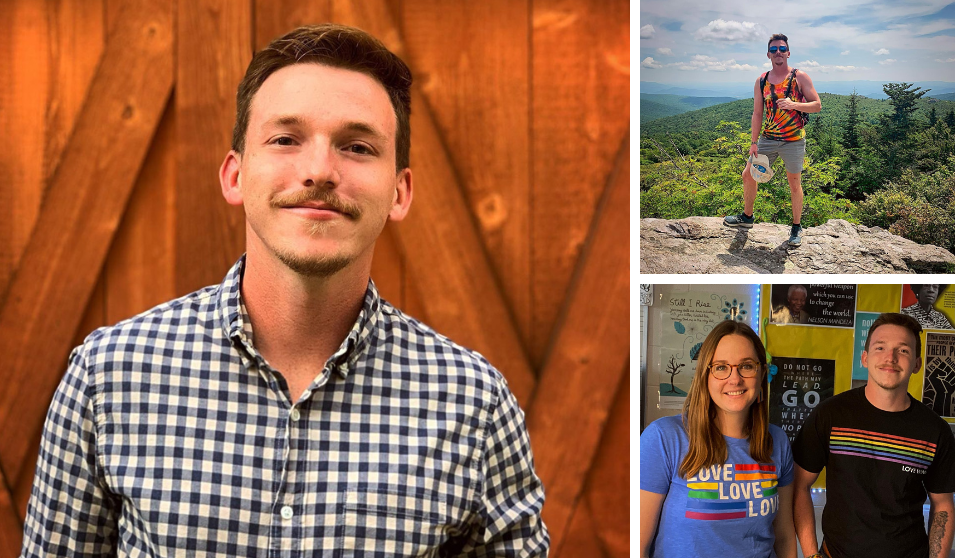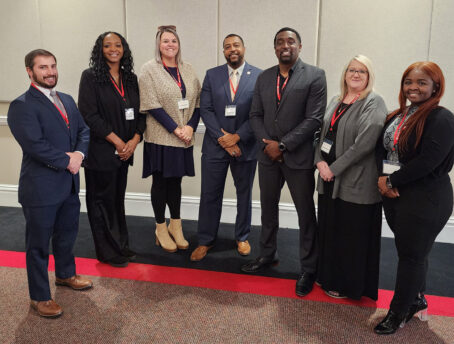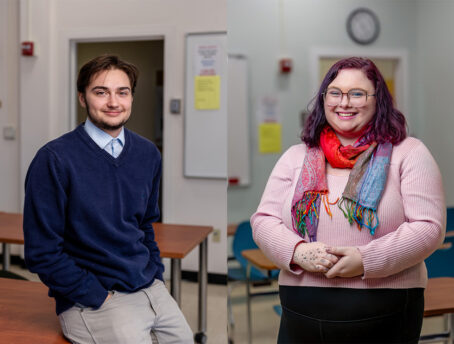Rural communities are increasingly diverse places, and the concept of queerness as it relates to rural places has proven complex to discuss. Clint Whitten, a former middle school teacher and current substitute at the same school in Blacksburg, VA, bases his doctoral research at Virginia Tech on just that: the intersection of queerness and rurality.
Clint is currently working on a Ph.D. in the Foundations of Education, and he explains how this topic is intertwined with his own lived experience:
“I grew up in my rural area, I grew up Southern Baptist, and my mother and my dad are huge pillars in our community, so the community really knew us. So, I actually am an openly gay man now, but I did not come out until I was 23 years old. That part of my intersecting identity, when it comes to my own research, is very personal because it's kind of part of me too. My research is based on my own positionality of being a middle school English, Creative Writing, and Theatre teacher in a rural surrounding area.”
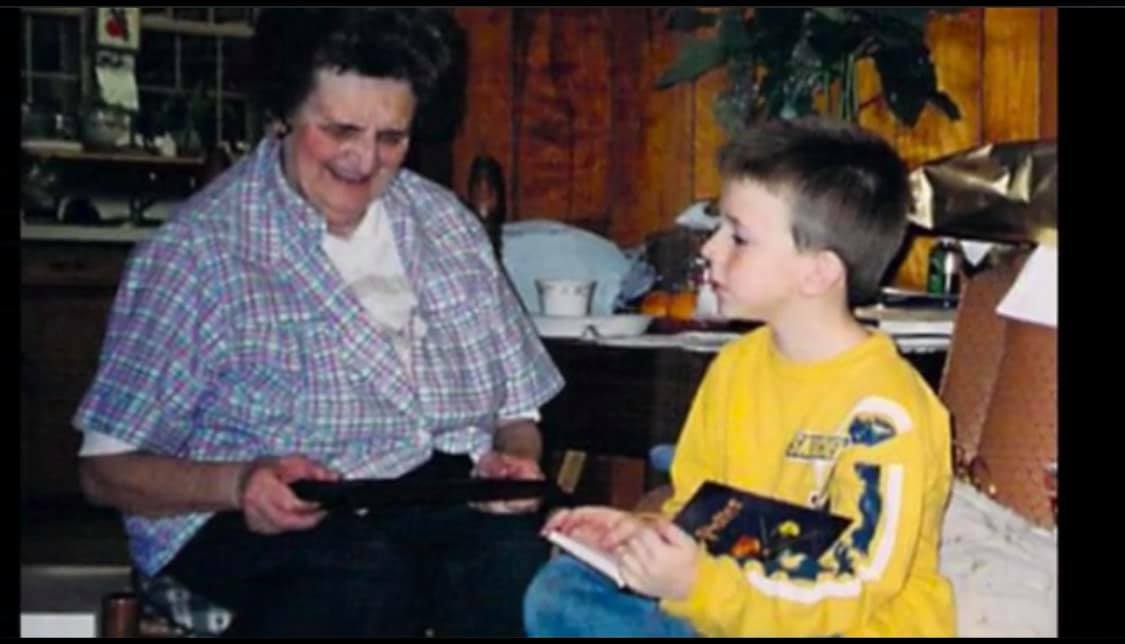
“Once I finally came out, it was really cool to see a community that, regardless, comes together - the way they handled things, the way they situated themselves with people. Some of my fears, which were in existence and were valid, caused me not to come out. I was so comfortable un-aliving myself for years before then. To come out and to finally get to exist for myself and then to get to do this work…it was really moving and it was really impactful for me.”
Clint believes that his students were the key players in his decision to be an openly queer educator. He explains that his students showed him the true value of representation; by being an out educator, he shows young people that they are not alone and they can find community:
“My coming out is so deeply connected to my classroom. I want my kids to feel represented, I want my kids to feel loved, and I want my classroom to be a space where they could get to be who they want to be. What I realized while doing that was, ‘How am I trying to sit here and ask these kids to be authentically them when I'm not being authentically myself? These kids understand humanity so much more than even I did. My students are the saviors of my narrative.”
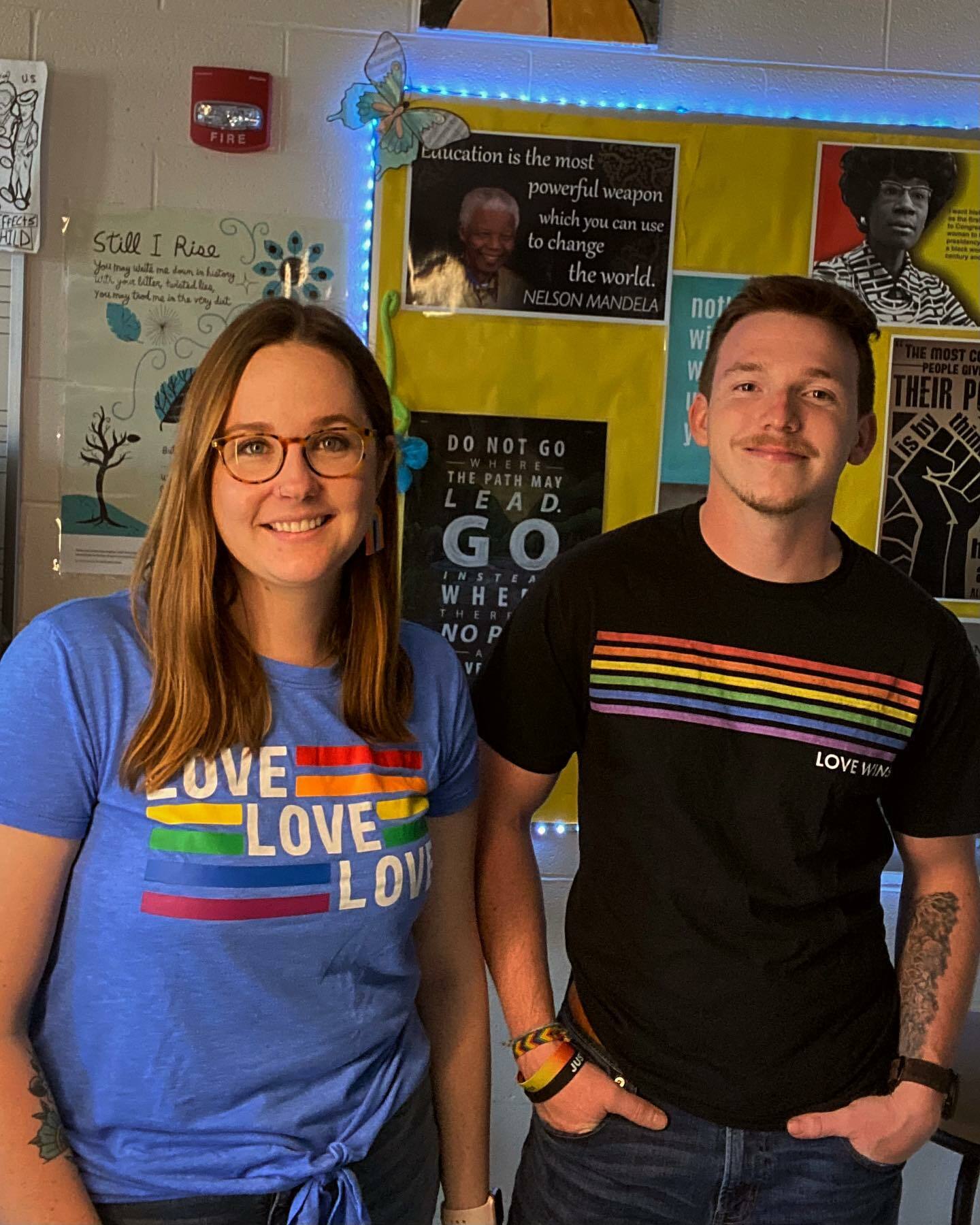
“After that, I became a pretty out educator. I had a super supportive school as far as it comes to administration, honestly pretty much from the parents too. But I don't know if there's any queer person out there that has never had some type of backhanded situation. I had a student mention to one of her classmates that I was a gay educator and the other student got up and walked out of the classroom. I had a faculty member come to me and say, ‘You know, Clint, I really love you and I love working with you but I really just don't support the lifestyle.’ Those are points of this tension and wobbliness.”
“I know this work is important because I know for every one of me, there's thousands of other rural queer kids who might have had the same fears that I did, or who may not have the same support in a community that I did, who may not have the family systems. Regardless of if my family agrees with me, my family hasn't left me. All of those variables have granted me certain privileges when it comes to coming out and when it comes to doing the research that I do.”
Despite the challenges of being a queer educator in a rural place, Clint also shared some successes and favorite interactions with students surrounding his own identity:
“I think one of my favorite memories is this, and I should preface this. Straight teachers historically have talked about their families and their relationships; it’s so crazy to me how people think it's so taboo for queer people to do the same thing. Anyway, the student was like, ‘Do you have a spouse at home?’ And I was like, ‘No, no, no…’ And they were like, ‘Oh, well, do you have a partner?’ This was really cool because the student was using a neutral, critical skill set to have this conversation. Finally she's like, ‘Are you gay?’ and I was like, ‘Yeah,’ and she's like, ‘Cool, I appreciate you being so vulnerable and transparent and open about that, because I don't think people oftentimes get to care about themselves and love themselves so much where it exists and it exudes for other people.’ It was that conversation and the conversation that I had with some of my other students that really showed me the importance of representation and being who you are, being outwardly proud of yourself.”
“Blacksburg hosted our first ever Pride March, and I was one of the speakers for that, and I had students who were in the audience that came over and hugged me, and they were like, ‘You really were a teacher that centered love in your classroom so much, and it was because you were learning to love yourself in that too,’ and I was like, 100% correct, because I deeply care about the humanity of learning and the humanity of school. I still substitute teach at my school because I think it's so cool how I can keep this centric of community in my life.”
However, he also recognizes that his story is not the only one to tell and acknowledges that we must intentionally create space for queer perspectives from all backgrounds:
“Looking at queerness in rural spaces from a white, able-bodied, cis perspective of course is inherently going to grant me privileges. Then you get into the idea of masculinity and femininity and how masc-presenting people can pass in certain spaces, especially in rural spaces. I think all of those - my subjectivity, my positionality, and my research - also highlight the spectrum of what it means to be queer and rural.”

“I don't want my narrative to whitewash so many other stories that aren’t celebratory, that are packed in trauma, that are connected to race tensions, that are connected to an able-bodied society. So, that's kind of how I position myself in my own research, by acknowledging the privileges that I still get to have but also unpacking the trauma, unpacking the celebrations that I've had, when it comes to queerness and rurality.”
While teachers fulfill many critical roles, Clint emphasizes that teachers must be active caretakers for the youth in their community, and in rural spaces this is especially true. By including queerness in his classroom, Clint feels that he can better serve his students:
“At the end of the day, public school teachers are public servants, and we are there to love and support every human that comes into that space. I don't know how I could have ever been able to sit there and not teach a queer text, especially when I'm looking around the classroom and I can identify queer students. At the end of the day, I'm there for all of my students, and I have queer students, and I have to be there for them too. I used to teach some really cool queer texts! And when I taught theater I showed them videos of drag queens doing makeup because they do it the best! It is so badass to be able to think about queerness in the centric of education.”
However, he also shares that it is becoming increasingly difficult to be that representation in the face of policies stacked against queer students, educators, and parents:
“Right now, we are under so much legislation and policy that is so anti-queer, and it vastly harms our queer youth, but I would say that it also vastly harms our queer faculty. I feel like especially for queer teachers we're constantly thinking that whatever we do, we have to have clear rationales around why we're doing it, especially when it comes to bringing in queer texts and queer visibility into our classroom.”
Clint believes that conversations concerning legislation must include a definition of place and an examination of how policies will impact urban, suburban, and rural communities in unique ways, as well as how identities intersect in those spaces:
“I think it's super important that we think about things from a top-down perspective of big government to state to local. Without defining place from the get-go in those conversations, we completely erase the value of rural communities because we aren't thinking about how a policy maker in DC is creating a blanket policy for an entire state that is covering Richmond and then Southwest Virginia. If we don't start centering place and rurality in these big, big concepts, and then the topics of race and queerness and able-bodiedness and all of that, we are missing some key intersecting identity work that should be done.”
“We all come from different spaces, we all come from different backgrounds, we all come from different privileges and identities. Everyone should get to see themselves in education. I think it is really important, and that's above identity, it's above place, it's above all of those concepts.”
Clint left us with a poetic description of his place, and reflections on what it means to be rural:
“My place is this mountaintop view with a river below it. I go to this place every single summer and it's my haven. I just put my hammock up, and I bring a book out there, and that regrounds me in my own journey of self-growth and reflection. It reminds me that I have the power of slowing down and really thinking about what we're doing in life, and so that would probably be my picture of a rural space.”
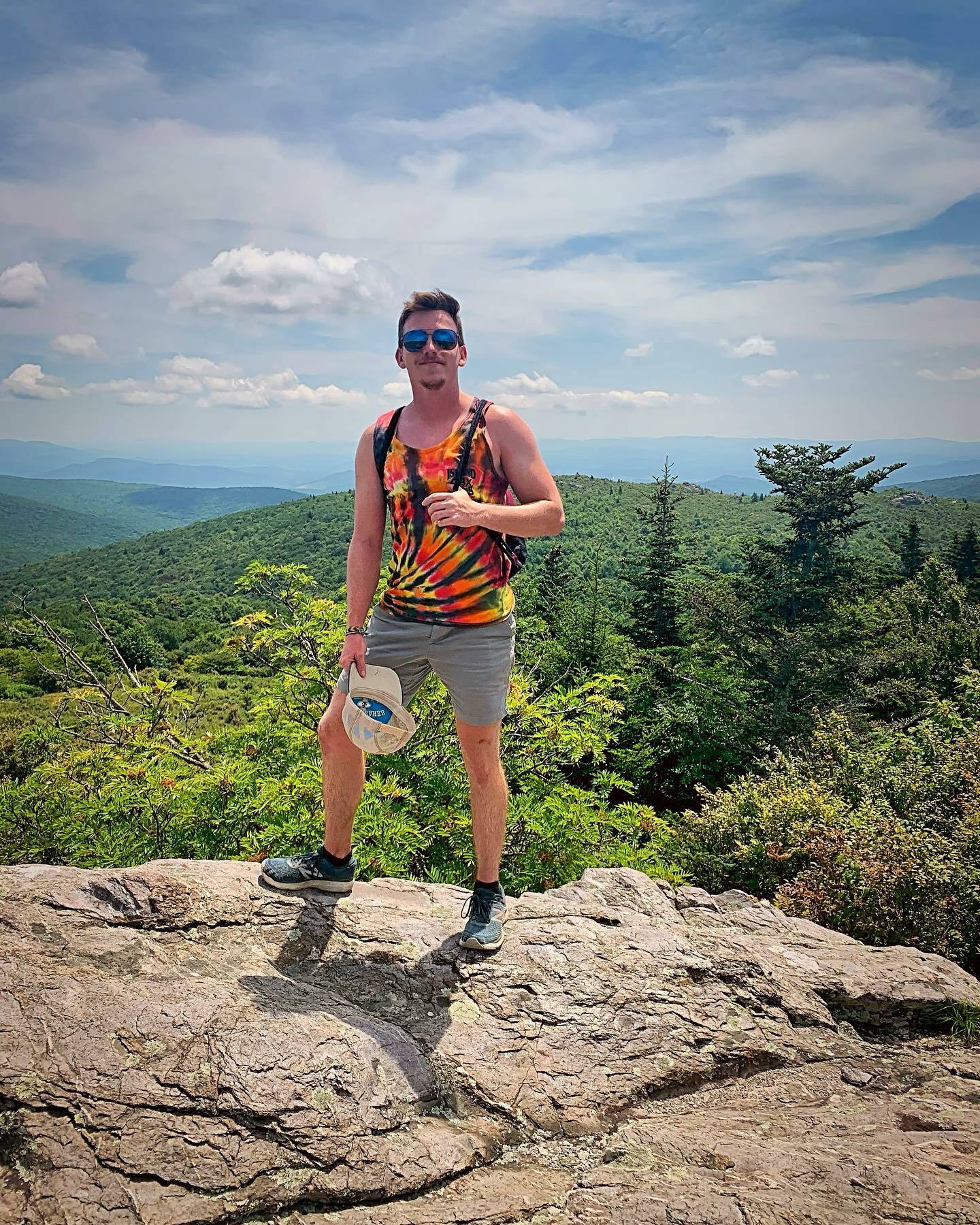
“Being rural, to me, means walking around barefoot in the river when I was a kid. It means getting together with my cousin, who was my best friend growing up because we were in the middle of nowhere. My being rural is this idea of building and valuing community, but also valuing that community so much that you hold it accountable and you hold it in a critical lens. Those pieces of community and the history of what you can do in a community are so important, and I think that that piece is super influential when it comes to educational opportunities too.”
We are grateful to Clint for sharing his story with us about his experiences as an educator in Virginia and his research concerning the intersection of queerness and rurality, and for paving the way for students and communities to discuss this complex topic. You can learn more about Clint’s research through his article ‘Eating the Earth’ here, or an article written for the Virginia Tech Center for Rural Education, ‘Border of the County Kid,’ here.
If you would like to share 30 minutes of your time, or complete an email interview, please reach out to us at info@ruralschoolscollaborative.org. This story was collected as part of our I Am A Rural Teacher project, a collaborative effort with the National Rural Education Association.

